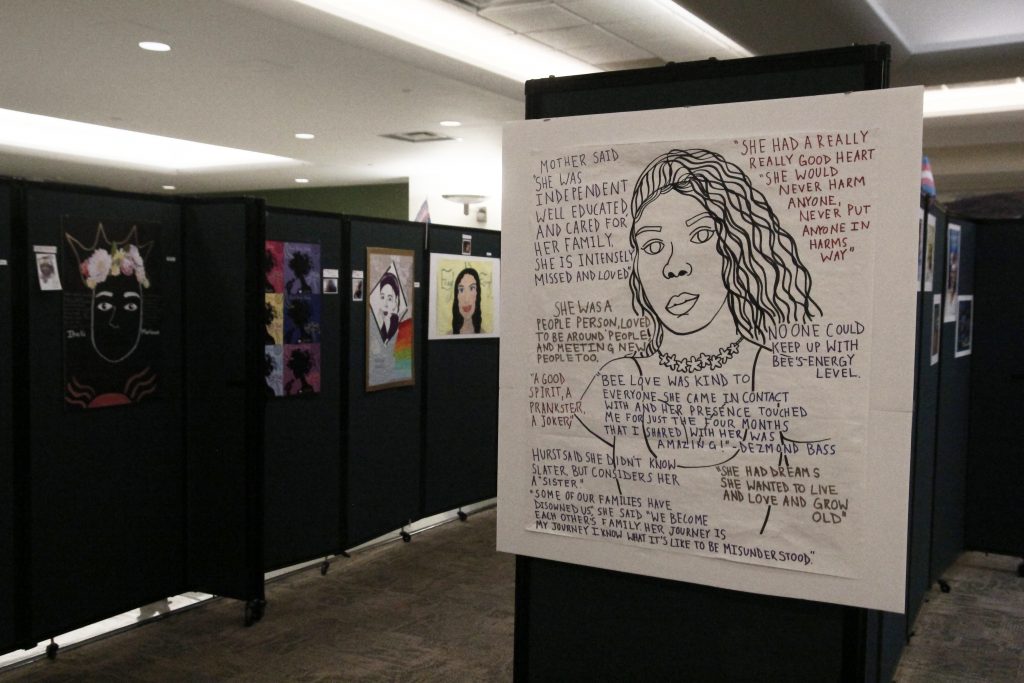
Following Transgender Awareness Week, Binghamton University participated in Transgender Day of Remembrance by putting on the “Art is Power Exhibit” from 10 a.m. to 4 p.m. on Wednesday, Nov. 20.
There were three parts to the art exhibition: a series of paintings that commemorated 22 transgender people who were murdered this year, 21 of whom were transgender women of color; a national exhibition from the organization Forward Together and a collection of artwork celebrating life and resilience by transgender and gender-expansive BU students. Soleil Aster, director of Transcend and a senior majoring in geological sciences, also contributed to the exhibition with performance art.
Michael Burt, co-organizer of the event and a first-year graduate student studying social work, said the exhibition was set up in the Tillman Lobby of the University Union since many people pass through the building. He said the event aims to raise awareness about transgender violence.
“When we were coming up with ideas, basically we’re thinking what would be the best way to bring awareness to the victims and also transgender violence in general and celebrate their lives, so we came up with this pop-up art exhibit[ion],” Burt said. “This is something that could very well happen here in Binghamton … We need to be aware and also be advocates for transgender people and use, as cis[gender] people, our power and privilege to help them and not put everything on the weight of transgender people to make a difference.”
According to Burt, people made portraits for the first display at a different event last week. Transcend, a social group for transgender, nonbinary and gender-expansive students, created artwork for the third display.
“We had a lot of support from different parts of the campus, which is great,” Burt said. “We also invited our trans students on campus — they’re part of the group Transcend — to create works of art that celebrate their own lives and puts out their message and what they want to say.”
However, Aster expressed concerns about the exhibition’s setup within the University Union. The artwork displayed was confined to standing wall panels, which were set up near the entrance of the Mandela Room.
“It came to a point where it was last minute, some of these decisions were made that [the exhibition] would be enclosed,” Aster said. “I think some of it had to do with the protests and kind of like the escalated tension and I think some of the visibility for [BU] … They originally made a little box right here and they told me I had to stay in it. They told me it was for my safety. I told them I wanted to be visible because this is our chance to use our voice and so I went out here and they told me I couldn’t do it, and they told me I need to get back in or I needed to leave the exhibit[ion] and it was my choice … So now I’m out on my own and I feel much safer.”
Aster said she wants transgender people to have more control in the exhibition on a day meant for them.
“I appreciate the work that the Q Center put into letting us have this representation, it’s just one of those tough intersectionalities where even though it’s for us, does it get to include us?” Aster said. “Do we get to have our say? I don’t know, it’s a tough balance for them and I think the Q Center has their hands tied a bit and it’s tough for me that the campus’ response to the hate and what’s escalating is to like hide us on our day.”
A candlelight vigil took place after the art exhibition at 5 p.m. on the Spine to honor the victims of anti-transgender violence. The names of the 22 honored victims were read aloud, and Rev. Becky Drebert gave a speech, according to Alyssa Seigel-Laddy, undergraduate programming intern for the Q Center and a senior majoring in business administration. Drebert, a transgender activist, served at Trinity Memorial Church in Binghamton and is now an episcopal priest in Bainbridge, New York.
Seigel-Laddy helped select Drebert as a speaker for the event.
“We got a speaker who’s an activist within the community,” Seigel-Laddy said. “They’ll be coming to speak because we felt that they were the most aware about this type of issue.”


